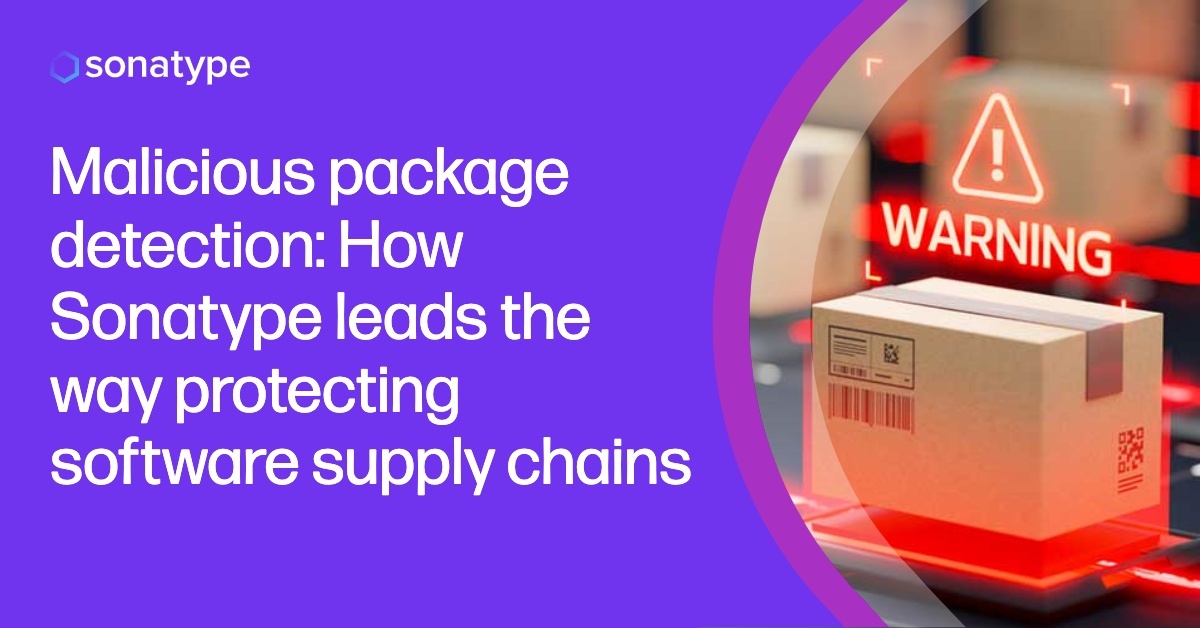Malicious Package Detection: Sonatype Secures Software Supply Chains
5 minute read time

Malicious packages present a growing danger to software supply chains. From typosquatting attacks to sophisticated malware hidden within open source components, detecting and preventing malicious packages has become essential for ensuring the integrity and security of software.
This is where software composition analysis (SCA) plays a vital role. Software composition analysis tools identify and track open source components within an application, helping organizations detect vulnerabilities, enforce security policies, and prevent the use of known malicious or outdated dependencies. As a result, SCA tools are now a cornerstone of modern DevSecOps practices, enabling teams to secure software at the speed of development.
Sonatype's position as a Leader in the Forrester Wave™: Software Composition Analysis, Q4 2024, underscores our unmatched capabilities across the SCA space, particularly in the detection of open source malware. Whether you're evaluating the best SCA tools for your organization or looking to shift security left, Sonatype delivers continuous protection at scale.

The Rising Threat of Malicious Packages
Malicious packages are intentionally harmful components inserted into open source ecosystems, targeting developers and organizations.
These packages can:
-
Compromise security by injecting malware or backdoors into applications.
-
Disrupt operations through ransomware or other malicious payloads.
-
Erode trust in open source software by exploiting widely used ecosystems such as npm, PyPI, and Maven.
According to our recent research, open source malware has now surpassed 778,500 identified packages, marking a significant and concerning milestone.
This alarming trend underscores the growing risks within software ecosystems, as malicious actors continue to exploit vulnerabilities in open source repositories. It highlights the critical need for organizations to adopt SCA tools and implement robust mitigation strategies to safeguard their systems and protect sensitive data from potential breaches.
Sonatype's Leadership in Malicious Package Detection
Backed by years of innovation and deep expertise in software supply chain security, Sonatype offers unmatched capabilities for identifying and blocking malicious open source components.
Our multi-layered detection approach combines automation, intelligence, and developer-centric tooling to stop threats before they enter your environment.
Powered by Advanced Threat Intelligence
Sonatype's malicious package detection capabilities are built on a foundation of cutting-edge threat intelligence.
Sonatype ensures that even the most evasive threats are detected before they can impact your software by leveraging the following:
-
Machine learning algorithms to identify anomalous behavior in package metadata, code, and distribution patterns.
-
Automated monitoring of open source ecosystems for new and modified packages.
-
Expert analysis from Sonatype's dedicated security research team.
Integration across the Software Development Life Cycle
With Sonatype Repository Firewall and Sonatype Lifecycle, malicious package detection and SCA tools are seamlessly integrated into the software development life cycle (SDLC).
This proactive approach ensures that:
-
Developers are alerted to malicious components before downloading or using them.
-
CI/CD pipelines automatically block harmful packages from being deployed.
-
Security teams gain visibility into risks across the entire software supply chain.
Examples of Real-World Impact
Sonatype's detection technology has identified and blocked numerous malicious packages, including high-profile examples like typosquatting campaigns targeting npm users.
By acting as a first line of defense, Sonatype has saved organizations from potential breaches and costly remediation efforts.
Key Features That Set Sonatype Apart
Sonatype's approach to malicious package detection is distinguished by a combination of curated threat intelligence, developer-centric tooling, and built-in support for regulatory compliance.
These features work together to deliver accurate, scalable, and policy-driven protection across modern software development environments.
Comprehensive Database of Threats
Sonatype's security research team maintains a constantly updated database of known malicious packages.
This enables:
-
Rapid identification of emerging threats.
-
Continuous improvement in detection accuracy.
-
A robust defense against both known and unknown attack vectors.
Developer-Friendly Workflows
Malicious package detection is designed to work seamlessly with development workflows.
Features include:
-
Real-time alerts directly within integrated development environments (IDEs).
-
Actionable insights to help developers understand and mitigate risks.
-
Automated policy enforcement to ensure compliance with organizational security standards.
Alignment with Regulatory Standards
Sonatype's capabilities support compliance with emerging regulations, such as the European Union (EU) Cyber Resilience Act and Network and Information Security Directive 2 (NIS2).
By preventing malicious package usage, organizations can demonstrate adherence to secure software development practices.
Driving Value Beyond Security
While the primary goal is to protect the software supply chain, Sonatype's malicious package detection delivers additional value:
-
Time savings by automating the identification and remediation of threats.
-
Increased developer confidence in the integrity of open source components.
-
Enhanced collaboration between development, security, and operations teams.
Check Out the Forrester Wave™ Report
Sonatype's top score in malicious package detection is just one of multiple reasons why we were named a Leader in the Forrester Wave™: Software Composition Analysis, Q4 2024.
To learn more about how Sonatype's solutions can protect your software supply chain, download the full Forrester Wave report.

Aaron is a technical writer at Sonatype. He works at a crossroads of technical writing, developer advocacy, and information design. He aims to get developers and non-technical collaborators to work better together in solving problems and building software.
Explore All Posts by Aaron LinskensTags

Try Nexus Repository Free Today
Sonatype Nexus Repository is the world’s most trusted artifact repository manager. Experience the difference and download Community Edition for free.